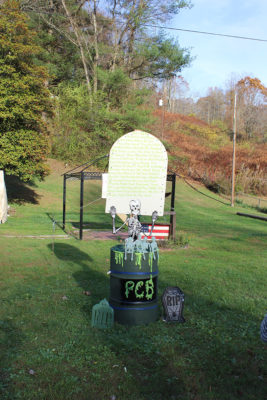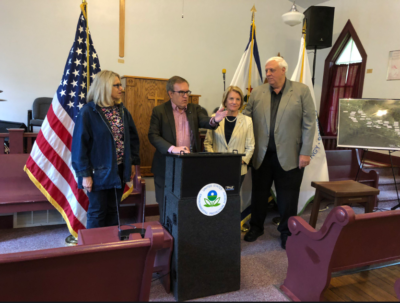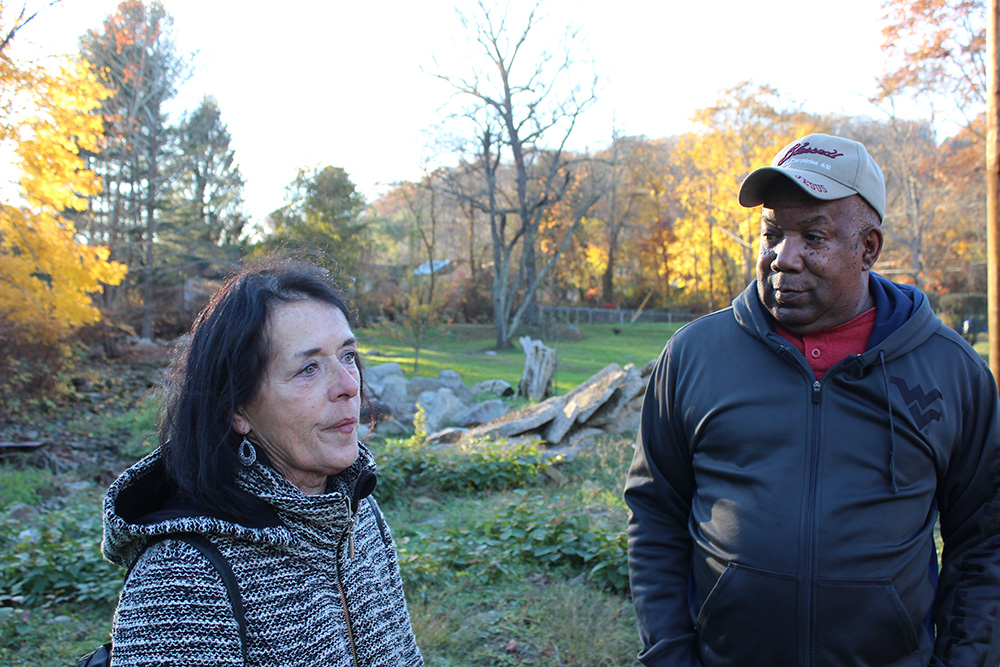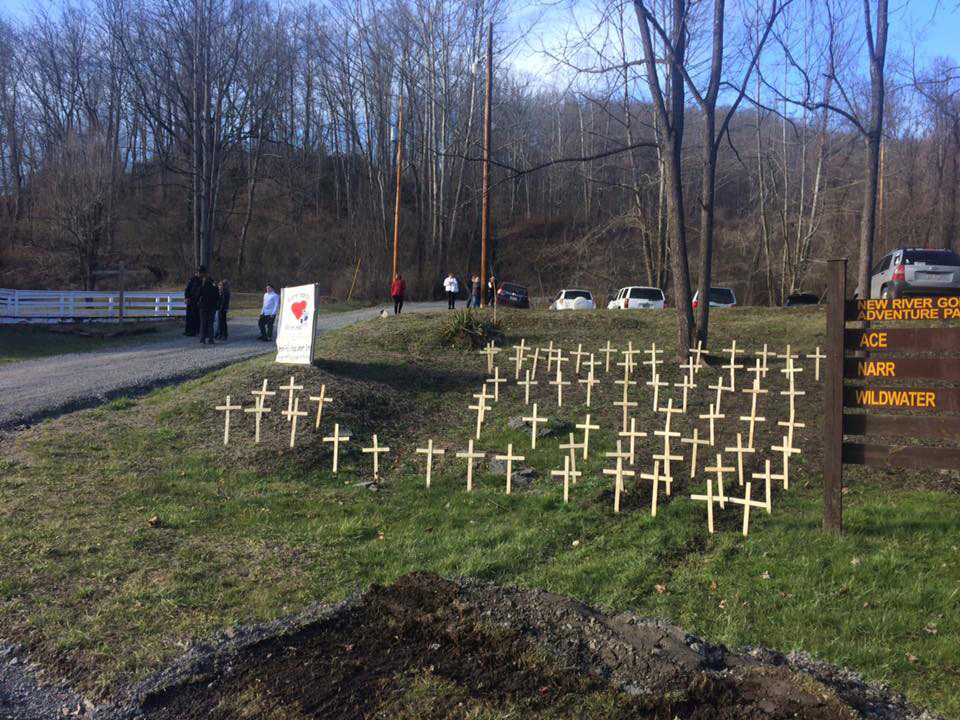Kevin Ridder | June 7, 2019 | No Comments
A registry compiled by Minden residents with help from local doctors shows that hundreds of former Minden residents have passed away from cancer. According to the citizen count, around 400 died from cancer prior to 2014, and 147 have died since. Ten more have been diagnosed since 2014.
“This year, we’ve had two since January pass away,” says Coffman.
She states that these numbers are unofficial because the West Virginia Bureau of Public Health only includes statistics for people who contracted or died of cancer while they lived in the town.
“Tomorrow, if I decided to leave Minden and next month I was diagnosed with cancer, if I were living outside of Minden, then my cancer would not be [officially] related to Minden,” she says.
Earlier in 2019, a state bill that would have required West Virginia to track cancer deaths more closely was abandoned by legislators after a state public health official claimed it would be too difficult.

A yard display raises awareness of PCB contamination in Minden. Photo courtesy of Headwaters Defense
The Minden-based Shaffer Equipment Company built electrical equipment for the coal industry from 1970 to 1984 and used the oil in transformers and other hardware, which was common at the time. The United States banned the manufacture of products containing PCBs in 1979, and the U.S. Environmental Protection Agency classifies the group of chemicals as a “probable human carcinogen.”
Multiple studies have shown that PCBs can cause cancer or damage the immune, reproductive, nervous and endocrine systems, to name a few. Although no official studies have been conducted to link PCBs to a cancer cluster in Minden, Coffman says, “I don’t see how it can’t be.”

EPA Administrator Andrew Wheeler announces the agency’s decision to add Minden to the Superfund list alongside, Gov. Jim Justice, U.S. Rep. Carol Miller, and U.S. Sen. Shelly Moore Capito. Public domain photo
Residents like Coffman say they were disappointed by the government’s past attempts. The EPA removed soil from the site twice between 1984 and 1991, and the agency cleaned up after an arson on the Shaffer site in 1997. In 2002, the U.S. Army Corps of Engineers placed an earthen cap over the site.
Coffman states that Minden’s relationship with the EPA is strained.
“They didn’t come back for years, so it’s really like they were nonexistent,” says Coffman. “When they did come back two or three years ago, nobody trusted them. I think that’s still the issue today.”
Now, most residents want the EPA to relocate willing townspeople. When Coffman and others went door-to-door to every Minden home in 2017, roughly 85 percent of the people surveyed stated they would move out of the town if they could be relocated. With Minden’s inclusion on the National Priorities List, Coffman says she has hope.
“I’m excited about it, I’m glad that after almost 40 years that it actually happened,” she says. “I just hope that they actually do something this time.”
However, EPA spokesperson Terri White states that the agency rarely relocates residents.
“Permanent relocation is only considered in cases where, for example, contamination poses an immediate threat that cannot be mitigated or remediated, implementation of remedial measures would require the destruction of homes, or the cleanup requires residents to be temporarily relocated for over one year,” wrote White in an email.
On June 8, the community plans to recreate the 1989 March for Minden. Like they did 30 years ago, residents aim to raise awareness of the community’s plight and advocate for their relocation.
Brandon Richardson, founder of environmental and health justice organization Headwaters Defense, lives just outside of Minden and helped to organize the march.
“We want to show the agencies and the community that 30 years have passed, and Minden is actually hurting just as much as they were in 1989 — worse, in fact,” says Richardson. “The EPA has tried to clean this up three different times, and they’ve failed miserably. People are sick and dying from cancer left and right. We need relocation.”
Lifelong Minden resident Percy Fruit recalls when Shaffer was still operating in the town. He and other local kids would play on the field where the company dumped the oil.
“We used that site as a playground; we didn’t know any better,” says Fruit. “We would play on that site and nobody instructed us to keep away from it.”

Minden resident Percy Fruit, right, stands with environmental activist Lois Gibbs, left. Gibbs visited Minden in 2017 to share how she helped to relocate her town of Love Canal, N.Y., away from a toxic waste dump. Photo courtesy of Headwaters Defense
“We would dip our hands in, take an old soup can, get in there and get some oil and put it on our chains on our bikes, and lubricated our chains like that,” he says. “And they dumped it all over the place.”
Fruit’s mother, father and grandmother died from cancer, and all three of his brothers have fought the disease at some point in their lives.
“Any day now I know I’ll probably end up with cancer,” he says. “But I’m putting it in God’s hands.”
Susie Worley-Jenkins has fought cancer six times throughout her 64 years in Minden. She explains that after Shaffer employees spent years dumping PCB oils into old mine shafts, the site somehow caught on fire and burned underground for around 20 years.
“When you would ride the bus to school and we’d get close to there, everybody was rolling up the windows and locking them because we knew it was going to stink so bad and you didn’t want that smell on you,” says Worley-Jenkins. “I lived by that all my life.”
“I’m not even going to leave my land to my grandkids like I’d originally planned, because I don’t want to fill them with cancer,” she adds. “It’s really sad because it belonged to my grandfather, my dad and myself.”
While Worley-Jenkins is confident that something will be done now that Minden is on the National Priorities List, she has her reservations.
“Am I 100 percent sure that this is going to be better than the last time?” she asks. “No, I’m not. They’re going to have to prove it to me.”

Each cross in this display that community members erected just before a U.S. Environmental Protection Agency visit in early 2018 represented one cancer case since the EPA’s previous visit in 2017. Photo courtesy of Headwaters Defense
“My analysis, at that time, was that PCB is a carcinogen, and it causes cancer,” Hassan Amjad told the Beckley Register Herald in May 2017. “It was based on a very small amount of information at the time. Very small.”
Hassan Amjad told the Register Herald that EPA toxicologists told Minden residents in the 1980s that PCBs posed no danger.
“They had a toxicologist that told all these people that, ‘Oh, this PCB is not dangerous, and, even if you eat a little bit, it will take care of your cancer,’” he said in an interview with the Register Herald.
Hassan Amjad spent years talking to current and former Minden residents to develop the community’s registry of people who had been diagnosed with or died from cancer. Today, his daughter Dr. Ayne Amjad is carrying on his work.
“It only made sense for me to continue,” says Ayne Amjad, noting that working on the cancer registry has been a slow process.
“A lot of the information we have is someone telling us their family’s health history,” she says. “I need actual hard evidence, paper documentation. We need help with that. I need grant money, research students; I can’t do this by myself.”
Ayne Amjad hopes the Superfund listing will lead to more resources so the community can relocate.
“I’m hoping the generation that’s worked this hard can see something come out of it,” she says. “It took them 30 years to get to this stage, so they might not — but maybe the next generation would.”
Soon after Shaffer left town in the fall of 1984, West Virginia regulators discovered that the company had left several hundred old transformers and capacitors behind. Soil samples revealed high PCB levels. Over the next seven years, the EPA excavated contaminated soil at the site under the eyes of former EPA employee Robert Caron.
Afterwards, the agency sued Shaffer Equipment Company and two other entities to pay for the $5 million cleanup — but the case fell apart when attorneys uncovered that Caron had lied about having master’s and bachelor’s degrees. Caron was fined $2,000 and sentenced to house arrest and probation in October 1992, according to The Baltimore Sun.
When PCBs were banned in 1979, the company dumped barrels of the substance into an abandoned mine shaft. Then, in 2001, a flood caused a mine shaft with leaking barrels of the PCB oils to burst.
“I think that’s when the PCBs actually got down into the residential area in 2001, because that’s when you really started seeing people being diagnosed with cancer more,” says Minden resident Annetta Coffman.
Following the mine shaft blowout, the EPA came to clean it up without telling residents about PCBs in the flood water, according to Coffman.
“We accidentally found it out, they were there for something like 14 or 16 months in hazmat suits repairing that site, but they never came into the residential area and told the people that it washed down into their homes,” says Coffman. “We had no idea. We were cleaning our homes out that were completely flooded in just regular clothes. We didn’t have gloves, we didn’t have masks, we didn’t have anything.”
Terri White with the EPA stated in an email that the agency is aware of those allegations, but does not yet have any data to back it up.
Afterwards, an earthen cap over the Shaffer site was installed by the U.S. Army Corps of Engineers in 2002 in an attempt to prevent further contamination. But many in Minden feel that the EPA did not properly clean it up or warn residents about the danger of PCBs; Coffman says the cap “breaks all the time.”
White wrote that sampling conducted in 2017 showed that the agency had successfully mitigated the release of PCBs from the site and that there was no immediate threat to residents.
“EPA also confirmed that historic PCB contamination exists throughout the town at low levels and that a small section of the cap was found to need repair, likely because of flooding impacts,” wrote White. “While repair is necessary the contents under the cap are not exposed.”
She adds that the agency can do a more in-depth study of the area as a whole now that it is on the National Priorities List.
In April, local high school students tested the water in the creek that runs through the town as part of an ongoing school project and found levels of PCBs above 50 parts per million. The EPA states that anything above 1 part per million is unsafe for soil and anything above 0.0005 parts per million is unsafe for groundwater.
“Most people won’t let their kids play in the yard there because it’s contaminated, so when the kids do play they’re playing in the middle of the road,” says Coffman. “I never would allow my kids to play in the creek, to even get near the creek.”
Now that Minden is on the National Priorities List, local advocates like Susie Worley-Jenkins are looking to finally move past their community’s toxic legacy. At June’s March for Minden, she says the community will again call on the EPA to buy out the homes of residents who want to relocate.
“They need to get it done, because we’re going to stay right on them,” says Worley-Jenkins. “It’s about relocation; a lot of the [deceased] people’s children and grandchildren will be walking.”
Like this content? Subscribe to The Voice email digests